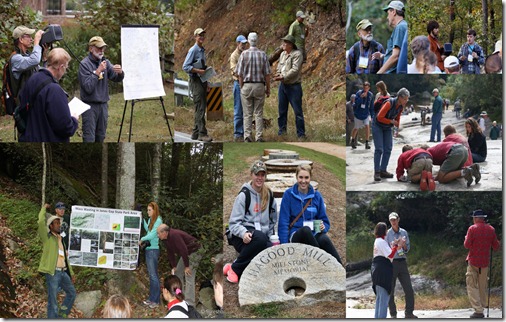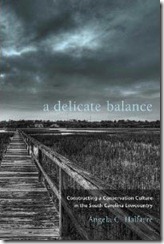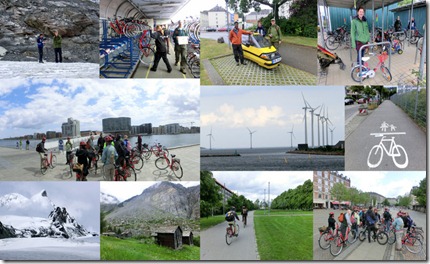Congratulations to Dr. Dripps for publishing the paper “Teaching and learning sustainability: An assessment of the curriculum content and structure of sustainability degree programs in higher education” in the Journal of Sustainability Science.
Category: Faculty News
GIS in community problem solving!
Using GIS and Drones, Furman University students are studying the existing condition of street lighting in neighborhoods with the goal of making these areas safe and reduce incidences of crime in Greenville communities. As part of their GIS class project taught by Mike Winiski of Center for Teaching and Learning, they have studied Po Mill and New Washington Heights communities in Greenville to field map street light conditions and intensity and now using drone technology for developing a model of street lighting reach so that this can be scaled to a larger area of study.
Students and faculty have worked with the community members to identify the problem and to address the problem through some kind of community based funding model, so the decision about the location of new streetlights is based not only on solid data, but more importantly the voice of the entire community. For more information, please check out: http://edge.furman.edu/lights-on-for-safety.html
Video compiled and edited by Taylor de Lench, Furman University
Dr. Anderson receives Fulbright Scholarship to teach in Croatia
By Tina Underwood
 Professor Brannon Andersen, Ph.D., has been awarded a Fulbright Scholarship for teaching and research at the University of Zadar in Croatia during the 2014-15 academic year.
Professor Brannon Andersen, Ph.D., has been awarded a Fulbright Scholarship for teaching and research at the University of Zadar in Croatia during the 2014-15 academic year.
Through the grant, Dr. Andersen will be affiliated with the Department of Ecology, Agronomy and Aquaculture, as well as the Department of Geography, at the University of Zadar. His teaching focus at the university will be increasing capacity in the areas of biogeochemistry and sustainability science. His research will be centered on methods of increasing organic carbon in degraded agricultural soils.
“With Furman as the only undergraduate liberal arts institution with a sustainability science major, we have much to offer other universities that are looking to strengthen their sustainability programs,” Andersen said. “My time in Croatia will allow me to contribute not only to a growing academic program at University of Zadar, but to also exchange ideas about how agroecological methods of farming could restore soil heath, sequester carbon dioxide from the atmosphere, provide a sustainable source of food, and improve water quality.”
Andersen said Croatia faces similar problems with degradation of agricultural soils as South Carolina, and his work in Croatia will help determine if agroecological methods being used by local farmers in the Upstate, such as intensive grazing, are transferable to Croatia.
The Fulbright Program, established in 1946, is the flagship international educational exchange program sponsored by the U.S. government and is designed to increase mutual understanding between the people of the United States and the people of other countries. Recipients of Fulbright grants are selected on the basis of academic or professional achievement, as well as demonstrated leadership potential in their fields. The program operates in more than 155 countries worldwide.
Andersen joined the Furman faculty in 1994 after completing his Ph.D. at Syracuse University. He is trained in geology, but has transitioned into an environmental scientist with a focus on biogeochemistry and sustainability science.
Andersen has been chair of the Earth and Environmental Sciences department since 2009, was named the Henry and Ellen Townes Professor of Earth and Environmental Sciences (1998-2000), the Association of Furman Students Faculty Member of the Year (2003-2004), a South Carolina Independent Universities and Colleges Teacher of Excellence (2008), and a Howard Hughes Medical Institute Distinguished Undergraduate Research Mentor (2010).
Andersen is also an adjunct professor in the School of the Environment at Clemson University and an associate editor for the journal Environmental Geosciences.
– See more at: http://newspress.furman.edu/2014/04/andersen-receives-fulbright-scholarship/#sthash.DhJJKVsI.dpuf
75th Anniversary Meeting of the Carolina Geological Society held in Greenville
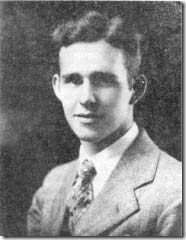 Photo to the left: Wilbur C. Holland circa 1930, founding father of the Carolina Geological Society.
Photo to the left: Wilbur C. Holland circa 1930, founding father of the Carolina Geological Society.
It was 75 years ago, in 1937, that Wilbur C. Holland, then Geology Professor at Furman University, founded the Carolina Geological Society (CGS) to create an active community of geologists in the area. The main purpose of the society is to promote the Geosciences, encourage the study of Earth Science, promote spirit of friendship and cooperation, and encourage research and publication. At the time of its founding, Holland envisioned a full day meeting with presentations of papers in a morning session and field trip in the afternoon. Currently, the meeting is held over three days, starting with a reception on the first evening, followed by a day and a half of field trips to various localities.
As a tribute to the 75th anniversary of CGS, Furman Earth and Environmental Sciences professors Dr. Bill Ranson, Dr. Jack Garihan, and Dr. Suresh Muthukrishnan conducted the meeting in Greenville. Field trips showcased the geology, geomorphology and landslide hazards in Upstate of South Carolina. A special celebration was held at the Table Rock State Park Pavilion on Saturday evening.
Students Brooks Bailey, Claire Campbell, Stephen Campbell, Katharine Compton, Elizabeth Johnston, and Ryan Richardson assisted the leaders during the planning stages and during the field trips, ensuring the safety of participants along congested roadways. Apart from these student assistants, 15 other Furman students attended the conference. A total of 156 total participants were present making it a successful event. The edited volume of the field guide in electronic format will be available from CGS website.
The department wishes to thank all the student assistants and especially Ms. Nina Anthony for their tireless efforts and help over the last several months. We also thank our recent graduate Jay Bridgeman (‘12) for leading a part of the field trip to the Salem ultramafic body on Saturday.
Prof. Angela Halfacre Publishes Her Book “A Delicate Balance: Constructing a Conservation Culture in the South Carolina Lowcountry”
Description from the University of South Carolina Press: Sustainability of the natural environment and of our society has become one of the most urgent challenges facing modern Americans. Communities across the country are seeking a viable pattern of growth that promotes prosperity, protects the environment, and preserves the distinctive quality of life and cultural heritage of their regions. The coastal zone of South Carolina is one of the most endangered, culturally complex regions in the state and perhaps in all of the American South. A Delicate Balance examines how a multilayered culture of environmental conservation and sustainable development has emerged in the lowcountry of South Carolina. Angela C. Halfacre, a political scientist, describes how sprawl shock, natural disaster, climate change, and other factors spawned and sustain—but at times also threaten and hinder—the culture of conservation.
Since Hurricane Hugo in 1989, the coastal region of South Carolina has experienced unprecedented increases in residential and commercial development. A Delicate Balance uses interdisciplinary literature and ethnographic, historical, and spatial methods to show how growing numbers of lowcountry residents, bolstered by substantial political, corporate, and media support, have sought to maintain the region’s distinctive sense of place as well as its fragile ecology.
A Delicate Balance deftly illustrates that a resilient culture of conservation that wields growing influence in the lowcountry has become an important regional model for conservation efforts across the nation.
Congratulations Dr. Halfacre!
Dr. Halfacre can be reached at: angela.halfacre@furman.edu
Welcome Dr. Betsy Beymer-Farris, Assistant Professor of Sustainability Science
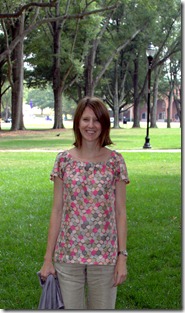 Dr. Beymer-Farris comes to Furman from the University of Illinois, Urbana Chanpaign where she completed her Ph.D. in Geography. As the new Sustainability Science hire in the EES Department, she will teach Principles of Sustainability Science (SUS 120) and Social Systems (SUS 241) courses this year. In teaching these courses, her role will be to motivate students to critically examine the dynamic social-ecological processes underlying the formation and change of place and space, and how they hold the potential to affect change.
Dr. Beymer-Farris comes to Furman from the University of Illinois, Urbana Chanpaign where she completed her Ph.D. in Geography. As the new Sustainability Science hire in the EES Department, she will teach Principles of Sustainability Science (SUS 120) and Social Systems (SUS 241) courses this year. In teaching these courses, her role will be to motivate students to critically examine the dynamic social-ecological processes underlying the formation and change of place and space, and how they hold the potential to affect change.
The integration of ecology with environmental politics and global economic development lies at the core of Dr. Beymer-Farris’s research interests. Dr. Beymer-Farris is a political ecologist who draws heavily from the literatures of social-ecological resilience, environmental history, and political economy. She has spent over ten years in Tanzania researching human-environmental dynamics of development issues related to global climate change, biodiversity conservation, forestry, fisheries, and aquaculture. She is interested in “sustainably utilized” landscapes, carbon forestry (e.g. Reduced Emissions for Deforestation and Degradation or "REDD+"), marine protected areas, alternative food networks, and in (re)conceptualizing social-ecological resilience.
Dr. Beymer-Farris’s office is within the EES Office Suit (Room 119A) in Plyler Hall. She can be reached by phone at 294-2505 or by email at Betsy.Beymer-Farris@furman.edu. Please join us in welcoming Betsy to Furman and Greenville.
Garihan et al., publish the Geologic Map of Campobello Quadrangle, SC

The South Carolina Geological Survey recently published the Geologic map of Campobello, South Carolina (GQM 51). It is available to the public at:
http://www.dnr.sc.gov/geology/publications.htm#gqm
This publication is the result of geologic mapping done in Summer 2010 by Earth and Environmental Sciences majors Alyssa Wickard and Rhonda Chan Soo, supervised by Dr. Ranson and Dr. Garihan. This research was funded by Furman Advantage Research Fellowship and logistical support was provided by SC Geological Survey. The students spent the summer time mapping the geology and structure in this area including tracing of the extent of the known brittle faults eastward within this quadrangle. In addition, Alyssa Wickard and JMG have submitted a manuscript to South Carolina Geology with emphasis on the polyphase folding in Campobello and its relationship to folding in the Inner Piedmont.
Faculty attend sustainability seminar in Europe
Brannon Andersen, Bill Ranson, Suresh Muthukrishnan, and our newest faculty member, Betsy Beymer-Ferris (starting in August), attended a Mellon Foundation funded travel seminar in sustainability that visited Copenhagen and Aarhus, Denmark, and Freiburg, Germany. A total of 18 faculty from 8 different colleges participated in this program. The group met with city planners, architects, and design experts in each city. We used public transportation for traveling between cities and used hired bicycles to travel within the city. Overall, we studied sustainable design in buildings, alternative energy, agriculture, and transportation. After the seminar was over, Betsy traveled on to do research in Norway and Sweden, whereas Bill, Brannon, and Suresh traveled with Dr. Becky Gould (Middlebury College) to Zermatt, Switzerland to study glaciers, glacial geomorphology, and water resource management (and lots of good hiking). The outcomes of the travel will be incorporating our experiences and learning into our curriculum and the development of a May Experience trip to Germany and Switzerland.
Click on links below to see some photographs from these places.
If you like us, you will Like Us on Facebook too!
The department of Earth and Environmental sciences is excited to announce that we are now on Facebook. If this doesn’t excite you, then hear this – Dr. Garihan now has a Facebook page too. If you don’t believe me, go and search. Well, we have posted lots of photos from the good old days out there for your pleasure. We hope you will like us and keep in touch. Post images and update us on your status.
As always, we would love to see you here – come any time.
Fall for India in 2011– A Semester Study Away Experience
This program will begin with intensive six-week course work at Furman, followed by a five-week residential experience at Madras Christian College (MCC) in Chennai, India. This will then be capped with a 4 week travel program from south to north India. The Fall 2011 courses offer an array of closely connected and interdisciplinary pursuits including, but not limited to, the natural environment, natural resources, population dynamics, urbanization, natural and anthropogenic hazards, gender, developmental psychology, poverty, health, culture, and sustainability.
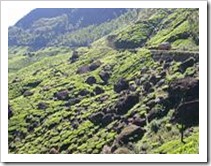 An ancient landslide dominates the landscape in this beautiful tea plantation along the Western Ghats (mountain) ranges of India. As one travels from Tamil Nadu (east) to Kerala (west), one can experience significant changes in the climate, vegetation, and culture. With abundant rainfall from monsoon, and relative inaccessibility, this region maintains it’s reputation as one of the top biodiversity hotspots in the world. We will learn about the origin of these mountains, agricultural practices (spice plantations!), natural hazards, health and educational issues, and sustainability challenges facing the people of this region.
An ancient landslide dominates the landscape in this beautiful tea plantation along the Western Ghats (mountain) ranges of India. As one travels from Tamil Nadu (east) to Kerala (west), one can experience significant changes in the climate, vegetation, and culture. With abundant rainfall from monsoon, and relative inaccessibility, this region maintains it’s reputation as one of the top biodiversity hotspots in the world. We will learn about the origin of these mountains, agricultural practices (spice plantations!), natural hazards, health and educational issues, and sustainability challenges facing the people of this region.![clip_image002[6]](https://blogs.furman.edu/ees/files/2010/09/clip_image0026_thumb2.jpg)
An oblique aerial view of the neighboring city and large river valley from top of the hill where an ancient temple sits. South India is famous for it’s rich culture, and temples with unique architecture and exquisite statues. Geologically, the rocks used to build these temples are some of the oldest rocks one can find in India.
Courses and Credits: This program offers four interconnected courses: Introduction to Geographic Information System (EES 201), India’s Natural Resources, Hazards, and Sustainability (EES 360), Poverty, Gender and Development in India (AST 282)Urbanization, Health and Environment in India (IDS 280) and will tentatively carry Empirical Study of the Natural World (NW), Humans and the Natural Environment (NE), Human Behavior (HB), and World Cultures (WC).
For More Information, Contact: Dr. Suresh Muthukrishnan (EES) and Dr. Veena Khandke (Asian Studies) or visit the following web sites
http://furman.edu/depts/asianstudies
http://furman.edu/depts/india/

